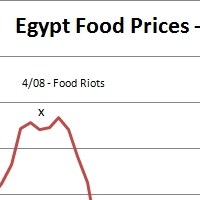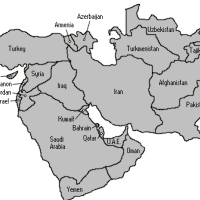![]()
By Rob Harris
An idealistic policy undisciplined by political realism is bound to be unstable and ineffective; political realism unguided by moral purpose will be self-defeating and futile.
— “Ideals and Self-Interest in America’s Foreign Relations”, Robert E. Osgood (1953).

A poster of former Egyptian president Mohammed Morsi sits in a pile in Cairo, Egypt on July 5, 2013.
The ousting of Egypt’s first elected president, Mohammad Morsi, has been quite a test for Western diplomacy, particularly for the European Union and the United States, both of which have invested significantly in the nation’s continued development.
Morsi’s regime had a problematic record on human rights. Thus, spectators might have been forgiven for thinking that an Egyptian regime more secularised, and so less intolerant of religious diversity, would have pleased the West. They could not have been more wrong.
Western responses to the way in which the Egyptian Authorities have dealt with both the Muslim Brotherhood protests, and associated terrorist links, demonstrate a self-defeating ideological blindness, which fails to address the realpolitik environment of the region, and patronises as much as it moralises.
This lack of diplomatic realism has merely reinforced an already pronounced diplomatic weakness.
Double standards at the European Union
The European Union issued a predictably strong response in the aftermath of the suppression of the pro-Morsi Cairo Sit-in protest. Three of the most senior EU officials publically threatened to cut off aid to a nation highly dependent on foreign assistance, whilst indicating a change to a more confrontational diplomacy, both at an EU and national member-state level:
Together with its member states, the EU will urgently review in the coming days its relations with Egypt and adopt measures aimed at pursuing” the goals of promoting an “end to violence, resumption of political dialogue and return to a democratic process.
The European Union stated that its 6.7 billion dollar aid package to Egypt was under review, just a few days after Morsi’s ouster. This rapid change in policy occurred after approximately 42 Egyptians died in clashes on July 8th. While the EU foreign policy mantra has been one of respecting human rights, democracy, etc., the sincerity of their commitment to such values can nonetheless be questioned.
The interim Egyptian government had publicly set out a timetable of reform for their Islamist constitution and the holding of democratic elections, one day before the EU expressed a change in its diplomatic policy toward Egypt.
The diplomatic fall-out worsened a week after the violent clashes of the 14th. EU foreign ministers decided to reduce military ties with Egypt in a special meeting on the crisis, and suspend export licensing for military equipment to Egypt. Provisions for security assistance would be up for review, with EU officials threatening further action if the situation in Egypt does not improve.
The ministers lambasted the crackdown on protesters but also criticized the violent acts by pro-Morsi elements, perhaps in an effort to appear balanced. However, blame was principally ascribed to the authorities. They demanded the freeing of prisoners and an end to the state of emergency. Such a stance indicates they did not seriously consider the challenges that the interim Egyptian government faces.
The EU agreed to pump 6.7 billion dollars into Egypt, in order to prop up its stagnant economy four months after Morsi’s election, at a time when problems had begun to emerge with his rule. A week later the intensive protests leading to his ousting began.
Furthermore, the EU’s annual 1.4 billion dollar aid package had become something of a moral hazard. A report noted that EU bureaucrats had systematically failed for years to ensure how the funds were managed.
Therefore, the timing of the EU’s diplomatic shift, and the very contrasting sanguinity it adopted over the intolerance of the Morsi regime, suggest EU policy tinged by pro-Muslim Brotherhood sentiment.
Notably Catherine Ashton was the first foreign official permitted to see Morsi after his ousting and detention.
Divergent voices within the United States
The United States Administration avoided branding Morsi’s removal from office as a coup d’etat, a controversial move that has been subject to much criticism.
Senate Foreign Relation Committee leader, Senator Bob Corker (Republican Party), sounded a cautious note
Egypt is a very strategic country in the Middle East and what we need to be is an instrument of calmness.
The Administration sought out a bi-partisan cross-party consensus, due in part to its problematic record on Middle Eastern issues, including the Benghazi controversy, which has refused to go away. Two senior Republican Party Senators, John McCain and Lindsay Graham, travelled to Egypt a month into the crisis, at Obama’s request. However, the portents for the impending visit did not augur well. Before the trip Graham told reporters:
We want to deliver a unified message that killing the opposition is becoming more and more like a coup.
Rather than strengthening diplomatic links, and perhaps developing an action-plan to resolve the crisis, McCain and Graham pre-emptively decided upon a strategy prior to their meetings with the interim Egyptian regime. The visit angered the Egyptian Administration, a development that such experienced politicians should have envisaged. McCain later added that the US had no credibility left in the Middle East, thereby bringing bi-partisanship to a likely close.
Latterly, the US sharply condemned Egypt’s provisional government for its relatively uncompromising policy on protests. President Obama stated after the break-up of the Cairo camp:
The United States strongly condemns the steps that have been taken by Egypt’s interim government and security forces. We deplore violence against civilians. We support universal rights essential to human dignity, including the right to peaceful protest. We oppose the pursuit of martial law, which denies those rights to citizens under the principle that security trumps individual freedom or that might makes right. And today the United States extends its condolences to the families or those who were killed and those who were wounded.
President Obama also ordered the cancellation of joint US-Egyptian bi-annual military exercises, a symbolic act considering the context of relations between the two nations, which were strained to an atypical extent.
Incoherence, and an evolving foreign policy
Whilst Obama’s response was thematically in keeping with that of the EU, it still marked a significant deterioration in Egypt’s relations with the West due to the close relationship the Arab State has with the US. By sharply criticising the protest crackdown, Obama may sound like he has adopted a position of moral rectitude to his Western audience. Yet an important question could be asked: what is he trying to achieve with these criticisms? Is he trying to please an electorate influenced by the pro-Morsi coverage in the mainstream media? Alternatively, is Obama attempting to get Egypt to tow-the-line politically?
To some extent, the Egyptians had already fallen out with representatives of the United States some days earlier. The Egyptian government’s increasingly strident response to foreign calls for restraint had already become apparent. Thus it seems probable that the strength of Obama’s criticism would only serve to alienate, and thereby make less likely the hearing of any appeals for greater moderation.
It has been suggested that there is significant pressure on the US Administration from “The Beltway” (an assortment of political voices, lobby groups and media influences) to cut off aid, supposedly to gain greater leverage in Egypt. Yet it may be that elements hostile to any moderating American influence in the Middle East are pushing this message.
However, there are some senior moderating voices in the US administration. Defense Secretary Chuck Hagel, who is against pulling aid, asserts that the U.S. has “important and complicated interests” in Egypt. At the beginning of August, Secretary of State John Kerry suggested that the Egyptian military was “restoring democracy”, although he quickly backtracked.
Boxing oneself into a corner
Over time however, the US diplomatic position appears to be hardening. There are reports that the US has unofficially put a delay on its funding to the Egyptian government for economic programs. The US Administration also condemned the detention of Mohammed Badie, the Muslim Brotherhood’s “Supreme Guide”, on terrorist charges. A White House spokesman stated:
It’s certainly not the standard that the Egyptian people expect of their government in terms of upholding basic human rights.
Unfortunately, Western governments appear to ignore the involvement of the Muslim Brotherhood in inciting violence through the guise of legitimate protest, such as calling for a “Day of Rage” immediately after the high death toll of August 14th.
Neither have they alluded to the consequences of the Muslim Brotherhood’s use of sectarianism to further their cause. The staggering levels of violence against Christians ought to cause greater concern, should the organisation hold the reigns of power again. Yet western diplomats have said little of substance other than to continue demanding reconcilation talks, without seriously addressing the challenges involved.
This issue may of course be influenced by coverage of the crisis. The mainstream media has given tacit support to Morsi, his supporters, and the notion an outright coup d’etat occurred. Sections of the media have also ignored the Muslim Brotherhood’s associations with terrorism.
The behaviour of the provisional Egyptian government indicates that those ruling the nation are very sensitive to the issue of their legitimacy, and whilst it seems the Obama administration would be a bit more comfortable with the Muslim Brotherhood out of the ring, as indicated by Kerry’s inopportune utterance, the United States has merely succeeded in alienating both sides. Worse, it has alienated the present leadership of the nation, who in ideological terms would be their natural allies, far more so than the Muslim Brotherhood, who clearly would not.
Foreign policy: balancing idealism with pragmatism
The US sends 1.5 billion dollars in aid to Egypt each year, along with additional grants. Whilst not an inconsiderable sum, it is largely spent on advanced US military wares, thereby funnelled back into the American economy. After the Sadat-Begin peace accords, Egypt became a focal point of stability in the Middle East, a stability that served America’s interests as well as those of Israel and Arabian states.
Some commentators describe US aid to Egypt as a “bribe” to keep peace with Israel. However, the challenges oil-dependent Western nations faced with the pan-Arab and USSR-Arab axis some decades ago caused ripples of greater import to the West. This was an Arab world that Egypt led. Therefore, it would be self-defeating for the US administration to effectively abdicate upon relations with this nation, especially after endowing it with a particularly strong army over some three decades.
With the United Arab Emerites and Saudi Arabia so keen to assist Egypt economically, any attempt at incentivised diplomacy based on the threat of withdrawing aid only serves to antagonise the Egyptian authorities. The cost Saudi Arabia is willing to pay to keep the much-feared Muslim Brotherhood out of governance, must surely signify the great importance of Egypt’s position.
Withdrawing aid may also be harmful to the prospects of the Egyptian people in the long term. Egypt is currently a dependent on foreign aid. 40% of Egyptians are believed to live on less than two dollars a day, with around half of those living on less than one dollar every day. Critical wheat stocks are also reported to be running out. Egypt’s employment rate is no more than 32.5%, a rather shocking statistic for a nation so central to the region.
There is no question that Egypt is important to the US/EU. However, their diplomatic strategies are rapidly contributing to the loss of any sway they once had on the State. Regardless of the legitimacy of the crackdown, the West’s ability to soften Egyptian reaction to these protests has been a total failure.
Yet the US/EU pushes on blindly. It would appear that the West has inadvertently begun a process of turning a vital prospective ally into a potential foe of considerable significance. Even without a strong hand to play, diplomacy would go much further for both the West and the people of Egypt, if it was used to engage the Egyptian authorities sensitively and judiciously. However, leading Western bodies have contented themselves with playing the role of self-righteous ideologue, heckling at the sidelines.
Rob Harris contributes articles to several websites on contentious political issues (not to be confused with the popular English novelist (1957-) of the same name). He blogs at eirael.blogspot.com. He lives in Ireland. For all the exclusive blog entries by Rob Harris, go here.



 RSS
RSS










Latest Comments
Hello Mike, Thank you for your positive feedback to the article. I felt there wasn’t too much critical analysis of ...
Thanks for this considered and well constructed article. A follow up article on the manner in which the editorial contro...
THE CLUELESSNESS OF CLAIMING THAT OBAMA'S MIDDLE EAST POLICIES WERE A FAILURE CANNOT BE FURTHER FROM THE TRUTH, WHAT THE...
As long as Obama is the president of the usa do not trust the us government......
Thank you for an good read....